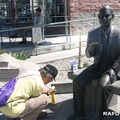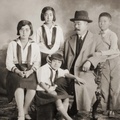Summers in the San Fernando Valley can be stifling hot, and during the 1950s when I was growing up, a screen door was a nice thing to have. There were no such things as air conditioners (at least, not in my neighborhood), and we didn’t even have a water air cooler to help cool the summer temperatures. A screen door allowed the occasional breeze to enter the house but would keep out the irritating flies and other insects that would come in. One day, my parents bought a new screen door and put it in our rear door, which led to the backyard.
When I was about five years old, I was a typical spoiled and self-centered rascal. One day, I was supposed to finish my lunch but I didn’t want to eat it all up. My mother scolded me for not finishing my rice, and I got angry and jumped off my chair and ran for the back door. I don’t remember why I was so upset, but as I approached the screen door, rather than pushing it with my hand, I kicked it open with my foot and ran outside. I wanted to play outside and not be made to sit inside the kitchen and finish eating my old rice. In my angry motion to open the screen door with my foot, I had kicked back about a 12-inch portion of the lower left hand corner of the new screen door. But I had no remorse; I was happy to be playing in the backyard with my toys.
I don’t recall my parents getting angry at me for my destructive deed. They didn’t scold or punish me for damaging their brand new screen door. They never said a word. I think now about how I would have handled such a situation, if my child had done what I did. I would have scolded my child, and lectured about how expensive this new screen door was, and that a spanking would be in order, and I would have delivered a spanking for such bratty behavior.

But my parents didn’t say a word. Neither did they repair the screen door. They left the corner of the screen pushed out, creating an opening, a breach in the defense against unwanted insects. For years, the screen door remained unrepaired. For years, everyday, as I walked in and out of the back door, I would see that corner of the screen, curled out, constantly reminding me of my actions and my moment of uncontrolled anger. For years, I knew that everyone in my family, who went in and out of the back door, would see that hole in the screen and remember who did it. For years, every time I saw a fly buzzing in the kitchen, I would wonder if it came in through the hole that I had created with my angry foot. I would wonder if my family members were thinking the same thing, silently blaming me every time a flying insect entered our home, making life more miserable for us all.
My parents taught me a valuable lesson, one that a spanking or stern words perhaps could not deliver. Their silent and passive punishment for my behavior delivered a hundred stern messages to me and waved a nagging finger at me every day. Perhaps, in the long run, it has helped me to be more accountable for my behavior, and more in control of myself, and even, perhaps, has helped me to become a better, more patient person.
Western parenting models seemed to stress that negative behavior should be punished immediately so that the consequences of the deed are clearly in connection. Not to do or say something (about my damaging the new screen door, as well as my angry refusal to not finish my lunch) would seen to imply that we are not affected or that we don’t care about the poor behavior of the child. This is not to say that any and all negative behavior of our children should be condoned or should be treated with passivity, for to do so would seen to be a prescription for totally spoiled and self-centered children with no knowledge of the bounds or good behavior. Yet, somehow, the message that I had done wrong came through a thousand times over, and they never had to say a word. It was not them wagging their finger at me but rather the door, flapping its loose screen at me.
My parents taught me that our “bad” behavior would cause shame (haji), that people will notice and will “laugh” if we don’t behave properly (warawareru), and that we should care about behaving properly. I believe this is why their non-action about the screen door would not imply condoning but rather would be a consistent message that my action has brought about a certain shame to myself that they will not seek to fix or remove until the lesson was driven home thoroughly. And. It was.
* This article was originally published in Nanka Nikkei Voices: The Japanese American Family (Volume IV) in 2010. It may not be reprinted or copied or quoted without permission from the Japanese American Historical Society of Southern California.
© 2010 Japanese American Historical Society of Southern California






